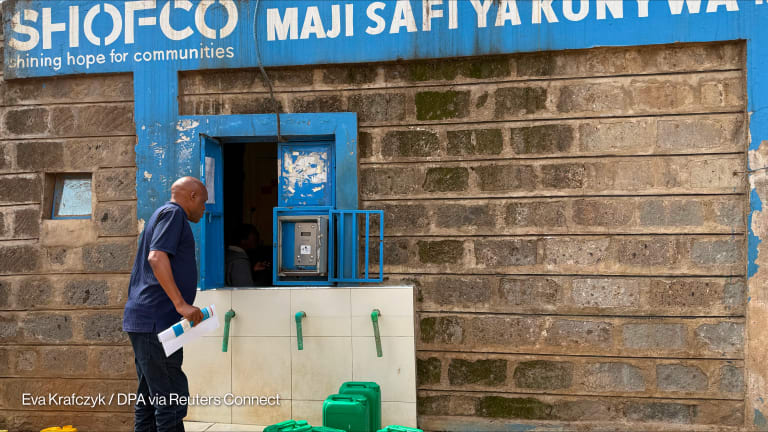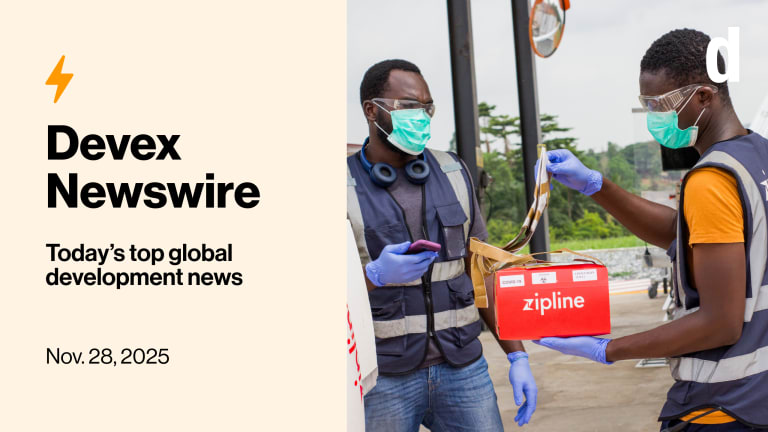A development leader preached diversity. He quit to prove he means it
By Omar Mohammed // 12 July 2023
Earlier this year, Patrick Meier stepped down as executive director of WeRobotics, the nonprofit he co-founded in 2015. Meier left, he wrote in a blog post, to open up space for a more diverse executive leadership. “With this next step, we can continue to walk the talk on diversity, equity, inclusion, localization and shift the power,” he said. Meier, who was born in Abidjan, raised in Nairobi, and is a Swiss national, began the work of WeRobotics about a decade ago. He told Devex that he noticed the world of development paid little attention to technology, particularly emerging tools such as drones, in tackling humanitarian challenges. The few examples that did exist were not led by individuals in the country where the humanitarian work was being done, and Meier saw an opportunity to design a model that put local leadership at the center of projects, he told Devex. The resulting organization, WeRobotics, has grown to become a global organization. While it is headquartered in the U.S. and Switzerland, the work is carried out through a network of locally led innovation hubs called Flying Labs, which use new technologies such as drones and artificial intelligence to deliver aid, support health services, and help in the mitigation of the effects of climate change. The Flying Labs network has decentralized its leadership and labs exist in more than 40 countries in Africa, Asia, Latina America, and elsewhere. But Meier told Devex that he felt there was tension between the idea of locally led projects preached by WeRobotics and Flying Labs and the lack of diversity in its leadership. “There's some cognitive dissonance here because what we are strongly advocating for, calling others to do, we have to do ourselves,” he said in an interview. “I felt like if we're really going to walk the talk around diversity, equity, shifting the power and so on, then we must do so internally.” So he quit. “I just felt that if we're going to be a model in our own humble, small way, then let's be the model. Let's not do it halfway, let's go all the way and walk the talk and then, let's hope that others will follow,” he told Devex. Meier, who is 45 years old, will now focus on local work in Switzerland, he told Devex. In April, he announced he will join The Swiss Institute of Technology at EPFL where he will help strengthen their master's and Ph.D. program in robotics and hopes to go back to teaching. “My role at the Swiss Institute of Technology is to be the focal point for robotics across the entire institute,” he told Devex in a follow-up email. “My core focus areas at EPFL are in other areas, including robotics innovation, social impact, and entrepreneurship.” In the meantime, WeRobotics has brought in Renee Welch, who comes to the organization after being recruited through Women and Drones, a Las Vegas-based organization that advocates for more women's involvement in the industry, to lead the next phase of the organization. Part of the reason they elevated an American-based leader was due to “the need to run part of the organization from the U.S.,” Andrew Schroeder, WeRobotics co-founder and board member, told Devex. “In the longer term the goal is to diversify the leadership of the organization through a set of regional hubs that will be led outside of the Swiss-US team,” he said. Not just the CEO Since its founding, WeRobotics has evolved and worked to include a more diverse group as part of its team. The organization’s core team includes a Swiss, two Americans, two Kenyans, a Mongolian, a Nigerian, an Australian, a Pole and a Fijian, Meier said. “WeRobotics did not always look like this,” he told Devex in a follow-up email. “We made it a top priority to walk the talk on diversity, equity and inclusion; same for the Board.” Having the top leadership of WeRobotics be white individuals became unacceptable, Meier told Devex. To achieve true diversity and shift power, change needs to happen in spaces where decisions are being made. WeRobotics has pointed out that in 2022, 56% of its revenue went directly to its network of locally led Flying Labs, according to pre-audited financials. A lack of action Meier was critical of the tendency of organizations that tout diversity but then only recruit diverse candidates in junior positions. “You look at the team pages and what happens is sure the junior roles are [from diverse backgrounds] — the ones with the least power,” he said. “You go further up, executive, white males, white males, maybe white women, white males, white males. So that is not my own definition of a diverse organization.” Three years after a global reckoning over racial and social justice following the murder of George Floyd, the global aid industry is still grappling with criticism of a lack of diversity. Meier said there was a lack of will to change. “The mindset is absolutely not there to actually decentralize, shift the power, take a backseat, phase out,” he said. But Meier says it is worth acknowledging that the people who work in aid have good intentions. “A lot of my colleagues in the humanitarian space have gotten into this space for all the right reasons. They care deeply,” he said. “They could be making more money and [be in] safer areas, than they are now.” But change is hard. “Their identity becomes their life. It becomes their mission and everything else and as humans, it's extremely hard for us to let go of something like that when it is front and center.” One way to overcome this is to conceive of a different role for the humanitarian industry. Meier said it was time for humanitarian organizations in the global north to take “an enabling role in this particular space rather than a leading role.” More work should be done by humanitarian organizations to decentralize and even phase out, Meier argued. “Why are we building these forever organizations that are in forever missions with no end in sight?” he asked. Meier said when he thought about his place in the development space and his advocacy of locally led development, he started looking at himself too. “Why is that not applicable to me? Am I supposed to be special? I mean, no,” he said. “I want to show that it can be done and there's no reason why I should be the only one doing it.” UPDATE, July 12, 2023: This story has been updated to add a quote from Patrick Meier about how he will act as the focal point for robotics at his new role at The Swiss Institute of Technology at EPFL.
Earlier this year, Patrick Meier stepped down as executive director of WeRobotics, the nonprofit he co-founded in 2015.
Meier left, he wrote in a blog post, to open up space for a more diverse executive leadership.
“With this next step, we can continue to walk the talk on diversity, equity, inclusion, localization and shift the power,” he said.
This story is forDevex Promembers
Unlock this story now with a 15-day free trial of Devex Pro.
With a Devex Pro subscription you'll get access to deeper analysis and exclusive insights from our reporters and analysts.
Start my free trialRequest a group subscriptionAlready a user? Sign in
Printing articles to share with others is a breach of our terms and conditions and copyright policy. Please use the sharing options on the left side of the article. Devex Pro members may share up to 10 articles per month using the Pro share tool ( ).
Search for articles
Most Read
- 1
- 2
- 3
- 4
- 5








